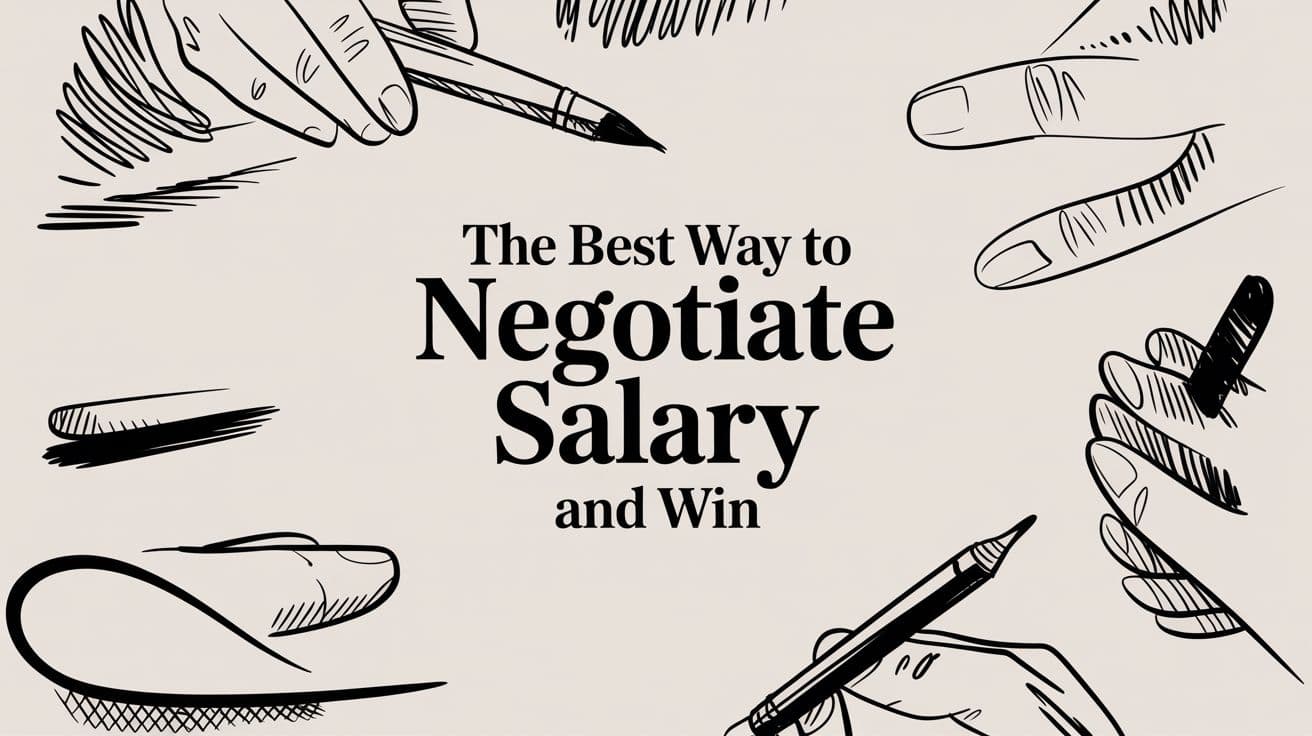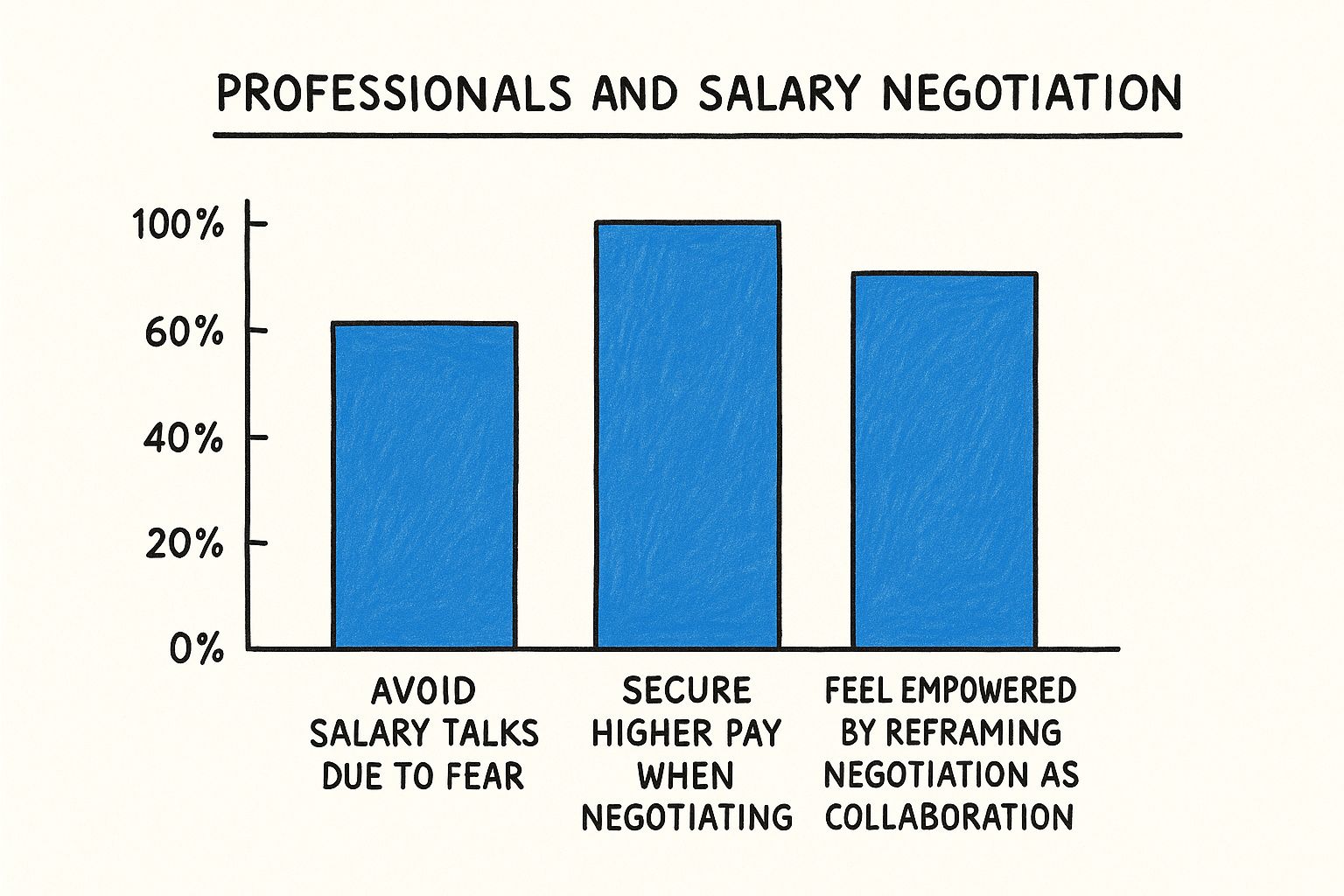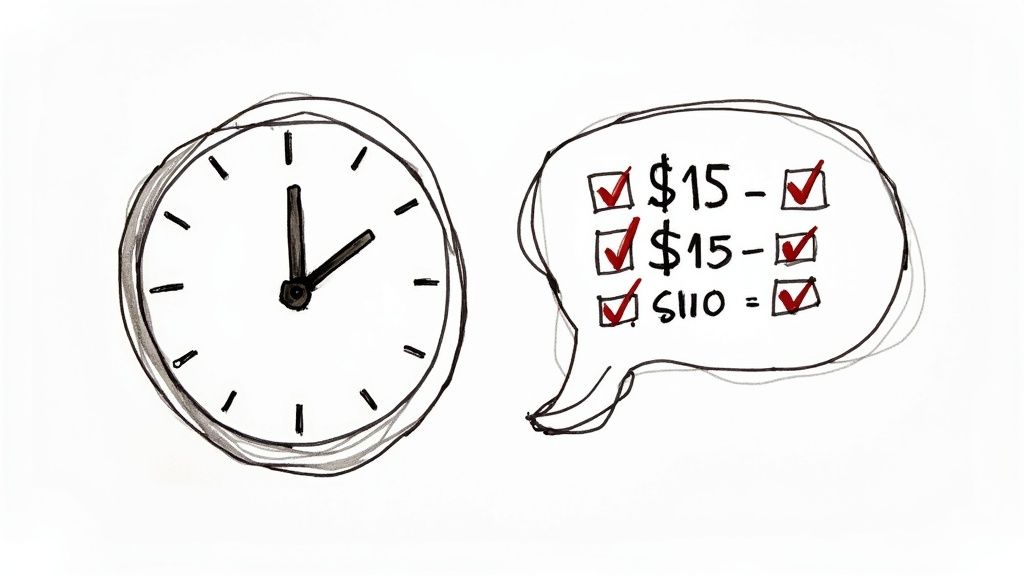The Best Way to Negotiate Salary and Win
Discover the best way to negotiate salary with our expert guide. Learn how to research, frame your ask, and confidently secure the compensation you deserve.

The secret to a successful salary negotiation isn’t about winning a fight; it’s about reframing the conversation entirely. Think of it less as a confrontation and more as a collaborative discussion about mutual value. It’s a process built on solid, data-driven research to define your worth, smart timing to present your case, and the quiet confidence to advocate for yourself professionally. This simple shift turns a potentially zero-sum game into a partnership.
Adopt the Right Mindset for Negotiation
Your success is decided long before you ever talk numbers. It starts inside your own head. So many people, especially when they're starting out, get a knot in their stomach just thinking about this conversation. They're afraid of looking greedy, souring a new relationship, or, in the worst-case scenario, having the offer pulled.
But here’s the thing: standing up for your value isn't just okay—it's what good employers expect.
The first real step is to change your perspective. Stop seeing it as a battle you have to win. Instead, approach it as a dialogue where you and the employer are working toward the same goal: finding a compensation package that makes sense for the value you're bringing. This is a business transaction, not a personal favor.
Overcoming Common Negotiation Fears
Fear is the single biggest roadblock standing between you and a better salary. It usually shows up in a few familiar ways:
- Fear of Rejection: We've all felt it—the worry that asking for more will get a flat "no" or, even worse, cause the company to change its mind. Let me be clear: a professional, well-reasoned negotiation almost never results in a rescinded offer from a reputable company.
- Fear of Seeming Greedy: Many of us were taught that it's impolite to talk about money. But this isn't a dinner party conversation. It's a professional exchange of your skills for fair compensation, and that’s just standard business.
- Fear of Inexperience: If you're early in your career, you might feel like you don't have enough leverage to negotiate. But every candidate has a unique skill set, and employers fully expect to discuss the fair market rate for those skills.
This infographic breaks down just how much mindset matters, showing the real cost of fear and the huge upside of confidence.

The numbers don't lie. While fear holds many people back, those who push past it and treat the conversation as a partnership almost always come out ahead.
The Employer's Perspective
It helps to remember what's happening on the other side of the table. A hiring manager has a budget, of course, but their primary goal is to hire the best person for the job. They fully expect a top candidate to know their worth and be prepared to discuss it.
When you present a request backed by solid research, you don't look demanding. You look professional, confident, and serious about the role.
Your negotiation isn't an inconvenience for them; it’s a standard part of the hiring process. They’ve already invested significant time and resources into recruiting you. At this stage, they want the deal to work just as much as you do.
The workplace culture around this is changing, too. Recent data shows that an incredible 67% of procurement professionals successfully negotiated their salary. This points to a much bigger trend where even people newer to the workforce are confidently asking for more.
With 53% of employers open to negotiating entry-level salaries, the old "take it or leave it" mentality is quickly becoming a thing of the past. Companies that won't negotiate risk losing out on great people. You can dig into more of the data on this trend over at Procurement Tactics.
By approaching this with a collaborative spirit, you position yourself not as an adversary, but as a proactive partner—someone who is already working to create a win-win for both you and your future employer.
Build Your Case with Data-Driven Research

Confidence in a negotiation doesn’t come from sheer nerve; it comes from solid preparation. When you walk into that room armed with hard data, the entire dynamic shifts. The conversation moves away from what you feel you deserve and toward what the market dictates you are worth. Suddenly, it’s not about opinions—it’s about facts.
This prep work is your foundation. Without it, you're just guessing, and any experienced hiring manager will see right through it. But with it, you present a compelling business case that’s almost impossible to dismiss.
Pinpoint Your Market Value
Your first real task is to nail down a credible salary range. Don't just punch your title into a single online calculator and call it a day. A truly solid number comes from cross-referencing multiple sources to get a full, nuanced picture of the market.
Each compensation platform offers a slightly different lens, so using a few in tandem is the best strategy.
- For a solid baseline: Start with sites like Payscale and Salary.com. They are great for getting a foundational understanding based on job title, years of experience, and location.
- For company-specific data: Glassdoor adds an essential layer by showing you user-submitted salary data for specific companies. This helps you see how a particular employer stacks up against the broader market.
- For tech roles and total compensation: If you're in the tech world, Levels.fyi is non-negotiable. It gives you incredibly detailed breakdowns of total compensation—base salary, stock options, and bonuses—often tied to specific job levels within major companies.
To give you an idea of why this matters, look at this example from Levels.fyi for a Product Manager at Google.

You can immediately see that "salary" is just one piece of the puzzle. Stock and bonuses make up a massive chunk of the total package. This kind of insight is exactly what you need to negotiate your entire compensation, not just a single number.
Your goal isn't just to find a number. It's to find a defensible range backed by multiple sources that reflects your specific skills, experience level, industry, and geographic location.
To make sense of the different resources available, here's a quick breakdown of what each platform does best.
Salary Research Resource Comparison
| Resource | Best For | Data Source | Key Feature |
|---|---|---|---|
| Payscale | General market baselines across many industries. | Crowdsourced user data and company surveys. | Detailed reports based on skills, certifications, and education. |
| Glassdoor | Company-specific salary ranges and reviews. | Anonymous employee-submitted data. | Insights into company culture and benefits alongside pay. |
| Salary.com | Traditional roles and corporate structures. | HR-reported data and third-party surveys. | Often aligns with established corporate pay scales. |
| Levels.fyi | Tech industry total compensation (salary + equity). | Verified, anonymous user submissions (often with proof). | Granular data by job level (e.g., L4, L5) and company. |
Using a mix of these tools will give you the most accurate and well-rounded perspective on your market value.
Quantify Your Accomplishments
Once you have your market data, you need to connect it directly to your own performance. Simply listing your job responsibilities from your resume won’t cut it. You have to translate your work into tangible, measurable results that scream "value."
This is where you build the "why" behind your ask. Think about your biggest wins and frame them with hard numbers.
For instance, don't just say:
- "Managed social media campaigns."
Instead, prove your impact:
- "Grew organic social media engagement by 45% in six months, which drove a 15% lift in qualified marketing leads."
And rather than saying:
- "Improved internal processes."
Show the result:
- "Redesigned the client onboarding workflow, cutting average onboarding time by 30% and boosting client satisfaction scores by 20%."
These data-backed statements aren't just claims; they are undeniable proof of the value you bring to the table.
Understand the Company's Compensation Philosophy
Finally, do a little digging on the company itself. Your request will land much better if it feels aligned with their internal pay structure. You're looking for clues about their compensation philosophy.
Are they known for paying top-of-market to attract the best talent? Or do they offer more modest base salaries but make up for it with incredible benefits, bonuses, or equity?
Here's how to find out:
- Read company reviews on Glassdoor, focusing on the "Salaries" and "Benefits" sections. You can find some real gems in the comments.
- Check their recent job descriptions. More and more companies are including salary bands directly in their postings, giving you a clear window into their ranges.
- Tap into your network. If you know anyone who works there (or used to), a quick, discreet chat can provide context you'll never find online.
This last bit of research ensures your ask is not only backed by market data but is also tailored to the company you’re talking to. It shows you’ve done your homework, which makes your proposal feel both reasonable and incredibly well-considered.
Strategically Time and Frame Your Ask

Knowing when and how to bring up money is just as critical as the number you have in mind. I've seen perfectly reasonable requests get shut down simply because of bad timing. On the flip side, a well-timed, thoughtfully framed ask can kickstart a collaborative conversation that leads to a fantastic outcome.
The golden rule here is simple: never be the first one to name a specific number. Whoever puts a figure on the table first sets the anchor for the entire negotiation, and you want them to do it, not you.
Your best move is to wait until you have a formal, written offer. At that point, you have maximum leverage. They've gone through the whole process and decided you're their top choice. Now, the conversation can truly begin.
Deftly Handling Early Salary Questions
It's almost inevitable. Early in the process, a recruiter or hiring manager will try to screen you by asking about your salary expectations. It's a standard play, but you can navigate it gracefully without giving up your advantage. When they ask, "So, what are your salary expectations?" your job is to politely deflect.
Here are a few phrases I've seen work wonders:
- “Right now, I’m really focused on understanding the role and making sure it's a great fit. I’m confident that if we get to that point, we can agree on a salary that’s both fair and competitive.”
- “Based on my research, roles like this in the area seem to fall in the $X to $Y range. Once I have a clearer picture of the responsibilities here, I’ll have a better idea of where this specific opportunity fits in.”
- “I’m more interested in the value I can bring to the team at this stage. I’m sure we can land on a fair compensation package once we both agree I'm the right person for the job.”
This approach shows you've done your homework but masterfully steers the conversation back to your qualifications and the role itself—exactly where it should be during the interview phase.
Remember, the interview process is a two-way street. You're vetting them just as much as they're vetting you. Committing to a number before you understand the job's full scope, the benefits, and the company culture is like making an offer on a house you've never stepped inside.
This is a high-stakes moment where a little practice goes a long way. Running through this exact scenario with a tool like SalaryCoach.ai can help you deliver these lines smoothly when you’re actually in the hot seat.
Receiving the Offer with Poise
When the official offer finally lands in your lap, how you react in the first 30 seconds is crucial. Whether it’s a phone call or an email, always lead with genuine gratitude and excitement. This keeps the tone positive and sets the stage for a collaborative discussion, not a confrontation.
Never accept (or reject) an offer on the spot. The goal is to receive it, say thank you, and give yourself the space to put together a thoughtful response.
If the offer comes over the phone:
Hiring Manager: “We were so impressed with you, and we’d like to formally offer you the position with a starting salary of $85,000.”
Your Response: “That’s wonderful news! Thank you so much, I’m very excited about this opportunity. Could you send the full offer details over in an email so I can review them? I’d like to look everything over and get back to you by, say, the end of the day tomorrow.”
This response is perfect. It’s upbeat, professional, and buys you precious time to prepare your counteroffer without any awkward, on-the-spot pressure.
Articulating Your Counteroffer
Once you've reviewed the full package, it's time to build your case. The best way to present your counteroffer is as a logical, data-backed proposal, not a demand. Think of it as simply continuing the conversation you've been having.
Start by restating your enthusiasm for the role. Then, you'll want to seamlessly connect your research on market value to the specific contributions you'll make.
Here's a sample script you can adapt for an email or your follow-up call:
"Thank you again for the offer; I'm thrilled about the prospect of joining the team. After reviewing everything and considering the market rate in [City/Region] for a role like this, especially for someone with my background in [mention 1-2 key skills], I was anticipating a figure closer to the [Your Target Number] range. Given my experience in driving [mention a key accomplishment, e.g., '20% growth in user engagement'], I’m confident I can deliver that level of value from day one. Would you be open to discussing this further?"
This framing is effective because it hits all the right notes:
- It’s Collaborative: Phrases like "closer to" and "discussing this further" invite a conversation, not a standoff.
- It’s Data-Driven: It grounds your request in market research and location, making it objective.
- It’s Value-Focused: It immediately reminds them why you're worth more by linking your ask to your proven results.
By mastering your timing and framing your request around mutual value, you turn what could be an uncomfortable hurdle into a professional dialogue about your shared future.
Navigate Objections and Negotiate the Total Package

You’ve made your case, presented your counteroffer, and then you hear it: "I'm sorry, but that’s outside our budget for this role."
Hearing a "no" can feel like hitting a brick wall, but it’s rarely the end of the conversation. In my experience, this is where the real negotiation often begins.
Successfully handling objections is a skill that separates good negotiators from great ones. The key is to stay calm, listen carefully, and pivot the discussion toward other forms of value. Think of it less as a rejection and more as an invitation to get creative and find a solution that works for everyone.
An initial "no" on base salary doesn’t mean you’ve failed. It often just means you've reached the limit on that specific line item in their budget. Now, it's time to broaden the conversation.
Responding to Common Roadblocks
When a hiring manager pushes back, their objection usually falls into one of a few common categories. Knowing how to respond keeps the dialogue moving forward and shows that you're a thoughtful, flexible partner in this process.
Here’s how to handle the most frequent objections with confidence:
The Budget Objection: "That's more than we have budgeted for this position."
- Your Response: "I understand budget constraints are a real factor. Could you share the approved salary range for this role? That would help me see where your offer fits in. Perhaps we can explore other areas of the total compensation package to bridge the gap."
The "Final Offer" Statement: "This is our best and final offer."
- Your Response: "I appreciate you being transparent with me, and I'm very excited about the role itself. Since there isn't flexibility on the base salary, could we discuss other components like a signing bonus, an extra week of vacation, or an early performance review?"
The Experience Objection: "We typically reserve that salary level for candidates with more experience in X."
- Your Response: "I can see why that's the standard. While my experience in X is still growing, my background in Y and Z has allowed me to [mention a specific, quantified achievement]. I’m confident this unique combination will bring immediate value to the team in a way that aligns with the higher end of the compensation range."
The key in every scenario is to acknowledge their point, gently reassert your value, and then pivot to a new area of discussion. This keeps the conversation collaborative, not confrontational.
Expanding the Negotiation Beyond Base Salary
Base salary is just one piece of the puzzle. When the conversation around that number stalls, it’s the perfect time to shift focus to the total compensation package. Many companies have far more wiggle room with one-time bonuses or non-cash perks than they do with recurring salary costs.
This is your chance to negotiate for benefits that hold significant value for you.
Valuable Perks to Negotiate
- Signing Bonus: A one-time payment upon joining can help offset a lower base. It's often easier for companies to approve since it doesn't impact long-term salary bands.
- Performance Bonus: Ask for a clearer, more structured bonus plan. Can the target percentage be increased, or can the goals be defined more explicitly?
- Additional Vacation Time: An extra week of paid time off can be worth thousands of dollars in terms of work-life balance and well-being.
- Professional Development: Request a dedicated annual budget for courses, certifications, or conferences. This shows your commitment to growth and benefits the company in the long run.
- Accelerated Performance Review: Instead of waiting a full year, ask for a six-month performance and salary review. This gives you a clear, near-term path to a raise if you hit your goals.
"A 5% increase in your starting salary might not seem life-changing, but compounded over a career, it can add up to hundreds of thousands of dollars. The best way to negotiate salary is to remember that even small wins have a massive long-term impact."
The data backs this up. Recent research shows that candidates who negotiated received an average offer 18.83% higher than their original proposal, with some increases reaching as high as 100%.
Despite this, over half of U.S. job seekers (55%) don't even try to negotiate. For those who do, success is common—around 66% secure the higher salary they requested. Simply knowing that negotiation is normal and expected can make all the difference. You can explore more findings from this salary negotiation research to see the full picture.
Closing the Deal with Confidence
Once you've reached a verbal agreement that you're happy with—whether it’s a higher base salary, a great signing bonus, or a combination of perks—the final step is to get it in writing.
Politely ask for an updated, official offer letter that details every component of your agreed-upon compensation package.
This includes:
- Base Salary
- Signing and Performance Bonuses
- Equity or Stock Options
- Paid Time Off
- Start Date
Review the document carefully to ensure it reflects everything you discussed. Once you’re satisfied, you can sign with confidence, knowing you successfully advocated for your worth and started this new professional relationship on a strong, collaborative note.
Know Who You're Talking To: Generational Negotiation Styles
The way we talk about money at work isn't one-size-fits-all. It changes, and a big part of that change is driven by the different generations in the workforce. If you can get a feel for how different age groups think about these conversations, you’ll have a serious leg up. It’s about anticipating their perspective and tweaking your own approach to connect better.
You see a fascinating split happening right now. Younger folks, especially Gen Z, came of age with salary data just a click away. They’re used to transparency, and it’s made them much more direct when it's time to talk numbers.
The New Guard is Asking for More—and Getting It
It turns out that younger professionals are becoming powerhouse negotiators. They’re not just asking more often than their older colleagues; they’re also getting what they want. The numbers back this up in a big way.
A recent survey found that while 45% of all workers try to negotiate their salary, Gen Z is really pushing the envelope. An impressive 55% of them negotiated their latest offer. That's a jump from Millennials (48%) and significantly more than Gen X and Baby Boomers (both at 42%). What’s even more telling? A whopping 79% of those Gen Z negotiators walked away with a better deal. If you're curious about the full breakdown, the Resume Genius report has more on these salary trends.
So, what's behind this confidence? It really comes down to three things:
- Data is their default: They don’t guess. They show up to the conversation with hard numbers from sites like Glassdoor and Levels.fyi.
- Pay isn't a secret: For them, talking about salary with friends and peers is normal. It’s seen as a way to ensure everyone is being paid fairly.
- They've learned to advocate early: They entered a tough job market and learned quickly that if you don't ask for your worth, you won't get it.
This is a lesson for everyone, no matter how many years you’ve been working. Being prepared with data and having the confidence to start the conversation clearly pays off.
Playing the Long Game: Experience as Leverage
While the younger crowd is making waves with their directness, seasoned professionals have a different, equally powerful card to play. For Gen X and Baby Boomers, leverage comes from a career’s worth of proven results, deep industry connections, and a history of making a real impact.
If you’re an experienced pro, your negotiation shouldn't just be about market rates. It needs to be a conversation about your unique strategic value.
Your negotiation isn't just about what the role is worth; it's about the unique, high-impact value that only you can bring to it. This includes your leadership, your network, and your ability to mentor—assets that are harder to quantify but incredibly valuable.
For instance, a senior-level candidate isn't just going to point to a salary survey. They'll frame it differently.
They might say something like, "Based on my fifteen years leading teams in this space and the key client relationships I can bring over immediately, I'm confident I can get this new division driving significant growth from day one. I'm looking for a compensation package that reflects that level of strategic impact."
See the difference? It shifts the entire conversation. You're no longer just a candidate asking for money; you're a strategic investment for the company. The goal is to blend your quiet confidence with a story of success, showing them that paying you what you’re worth is one of the smartest business decisions they can make.
Salary Negotiation Questions Answered
https://www.youtube.com/embed/q7veOz17r2Y
Even with a mountain of research and a solid game plan, you're bound to run into curveballs during a salary negotiation. Thinking through the "what ifs" ahead of time is your secret weapon for staying cool under pressure.
Let’s walk through some of the most common questions and tricky situations that pop up at the negotiating table. Handling these moments with grace doesn't just protect your bottom line—it shows you’re a thoughtful, professional problem-solver. That's a huge win.
What if They Give a Lowball Offer?
It’s a gut punch. You get the offer, and the number is way below what you expected or what the market dictates. Your first instinct might be disappointment, but don't let it derail you. A low offer is often just a starting point, not the final word.
The key is to stay professional and shift from an emotional reaction to a data-driven conversation.
Here's a way to frame your response that keeps the dialogue open:
"Thank you so much for the offer; I'm really excited about the possibility of joining the team. Based on the market research I've done for similar roles in this area, the figure is a bit lower than I was anticipating. Would you be open to sharing how you arrived at this number? Understanding the overall compensation philosophy would be really helpful for me."
This simple script does two powerful things at once. It avoids making things adversarial and politely invites them to justify their number, putting the focus back on the market data you’ve prepared.
When Should I Negotiate Over Email vs. Phone?
It can feel safer to hide behind a keyboard, but a real-time conversation over the phone or video is almost always your best bet for the actual negotiation. You can build a genuine connection, read the tone of the conversation, and convey your enthusiasm in a way that plain text just can't match.
That said, email definitely has its place. Think of it as a tool for logistics, not negotiation.
- Email is great for: Requesting a time to chat about the offer, following up with a written summary of what you discussed, and getting that final, revised offer in writing.
- The phone (or video call) is for: The actual back-and-forth. This is where you’ll present your counteroffer and discuss the full compensation package.
Live conversations feel more collaborative and less like a demand. It’s much easier to find common ground when you can have a real human dialogue.
How Do I Know When to Walk Away?
This is the toughest question, but the answer starts before you ever get the offer. You need to know your walk-away number—the absolute minimum you're willing to accept based on your budget and your market value. This isn't a negotiating ploy; it's your personal baseline.
It might be time to politely decline if:
- The final number doesn't meet your minimum, even after you’ve tried to negotiate other benefits like vacation time or a signing bonus.
- They’re hesitant to put the full, agreed-upon terms into a formal, written offer letter. That’s a major red flag.
- The negotiation itself reveals things about the company culture you don't like, such as a lack of transparency or a dismissive attitude.
Saying "no" to an offer that isn't right for you isn't a failure. It’s an act of professional self-respect. It signals that you know your worth and are willing to hold out for an opportunity that truly values what you bring to the table. You can always part on good terms, leaving the door open for the future.
Ready to put this advice into practice? The single best way to get comfortable with negotiating is to do it. At SalaryCoach.ai, you can run through realistic negotiation scenarios with an AI coach that provides instant, personalized feedback on your strategy, what you say, and how you say it. Give a free session a try and walk into your next negotiation with total confidence.
Article created using Outrank
Ready to Practice Your Negotiation Skills?
Start practicing with our AI coach and build confidence for your next salary negotiation.
Start Practice Call